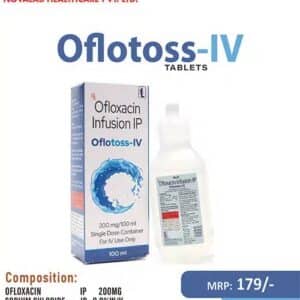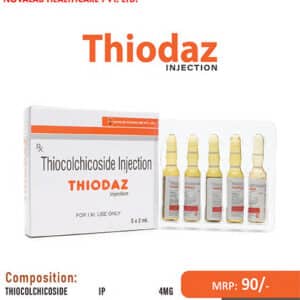- Home
- INFUSION SECTION
- Levofloxacin Injection


Levofloxacin Injection: Levofloxacin is a drug that is generally used to treat bacterial infections in the body. It belongs to the fluoroquinolone class of medications and inhibits the growth and spread of bacteria. Healthcare professionals generally administer the injection directly into the bloodstream.
Levofloxacin injection is effective against a variety of bacterial infections, including respiratory tract infections, urinary tract infections, skin and soft tissue infections, and intra-abdominal infections. It is frequently used when oral antibiotics are ineffective or a stronger treatment is necessary.
How to Use Levofloxacin Injection
Levofloxacin should be administered by a healthcare professional. Here are some general guidelines for using it:
- Preparation: ensuring the precise dosage and, necessary, dilution of the injection is generally prepared by a healthcare expert.
- During 60 minutes, it is gently delivered into a vein. In some situations, it may also be administered as an intramuscular injection.
- Dosage and frequency: The doctor will set the particular dosage and frequency of levofloxacin injections based on the kind and severity of the illness. It is critical to strictly adhere to the suggested dosage and schedule.
- In case you start feeling better before the course is completed kindly don’t skip the course and complete the entire course as advised by the doctor. This ensures that the infection is completely cured and lowers the chance of antibiotic resistance.
- Always follow medical advice: Always follow the recommendations given to you by your healthcare provider. If you have any questions or concerns about using levofloxacin injection, talk to your doctor or chemist.
Benefits of Levofloxacin Injection
Levofloxacin Injection is an antibiotic medicine that is used to treat bacterial infections in the body. following are some important
- It is frequently used to treat a variety of infections, including intra-abdominal infections, skin and soft tissue infections, urinary tract infections, and respiratory tract infections. Levofloxacin is a broad-spectrum antibiotic, which means that it is effective against a variety of bacteria.
- The injection provides quick action as it is injected directly into the bloodstream. Accordingly, the drug reaches the infectious area quickly.
- The medicine can be administered in larger quantities through injection. This helps in increasing its potential against difficult-to-treat or resistant illnesses.
- It is frequently recommended when oral antibiotics are ineffective or when a more powerful remedy is needed.
- Convenience for hospitalized patients: Patients who are hospitalized or unable to take oral drugs benefit most from the levofloxacin injectable. It guarantees controlled and consistent dosing, particularly when easy intravenous access is available.
- Dosage adjustments can be made by medical specialists by the age of the patient, the severity of the infection, and other variables. This makes it possible to create customized therapy regimens that will improve therapeutic results.
How Levofloxacin Injection Works
Levofloxacin injection works by inhibiting bacterial enzymes called DNA gyrase and topoisomerase IV. These enzymes are essential for the replication, repair, and transcription of bacterial DNA. It binds to these enzymes, interfering with their activity and causing DNA damage. As a result, bacterial DNA replication is disrupted, and the bacteria are unable to multiply and spread. This bactericidal effect makes levofloxacin effective against a wide range of Gram-negative and Gram-positive bacteria. It is important to use levofloxacin as prescribed, as misuse or overuse can contribute to the development of antibiotic resistance.
Precautions while using Levofloxacin Injection
while using Levofloxacin Injection several safety measures should be taken. The injection may cause some serious allergic reactions, therefore it’s important to inform your healthcare practitioner about any known allergies. use caution or report your doctor immediately in case of any swelling or pain in the tendon. In older persons, levofloxacin has been linked to an increased incidence of tendonitis and tendon rupture. Central nervous system side effects, like dizziness and confusion, can develop while driving or using machinery. using the injection can make your skin sensitive to sunlight so use sunscreen to prevent any sunburn. It is often avoided during pregnancy and nursing, so it’s vital to let your healthcare practitioner know about all of your prescription drugs and health concerns before beginning treatment.
Side Effects of Levofloxacin Injection
Just Like any medication, levofloxacin injection might have negative side effects. following are some of the side effects of using the injectables:
- Effects on the Gastrointestinal System: Frequent side effects include nausea, vomiting, diarrhea, and stomach pain. The majority of these symptoms are minor and go away on their own. Keep yourself hydrated and let your doctor know if these side effects worsen or persist.
- the injectable side effects on the nervous system include headache, sleepiness, dizziness, and insomnia. It’s possible for some people to feel uneasy anxious or confused. Seek medical assistance if these symptoms worsen or seriously interfere with your daily activities.
- Levofloxacin has a risk for tendonitis, or the inflammation of tendons, and tendon rupture, especially in elderly persons. If you suffer tendon discomfort, swelling, or a snapping or popping sensation in a tendon, stop taking the drug and call your doctor right once.
- the injection has been known to occasionally induce allergic responses, but these are uncommon. If you have symptoms such as rash, itching, swelling (particularly of the face, lips, or neck), severe dizziness, or difficulty breathing, get immediate medical attention.
- It may increase your skin’s sensitivity to sunlight, making sunburn more likely. Use sunscreen outside to shield your skin from the sun’s rays.
Related products
We are a research-based pharmaceutical company. The mission of Novalab Healthcare is to improve the health of the Indian community by providing them with quality
Quick Links
Location
- Plot No-208, Industrial Area Phase 1, Panchkula, Haryana 134113
- Novalab7777@gmail.com
- +91-9570599567
- +91-9115604598





